Few things are seen as more American than the act of voting. Journeying to the nearest polling place, being greeted by the friendly volunteers, filling out a ballot and even getting to don your very own “I Voted” sticker. It is a process in which many in our country take pride. However, it is also a process in which many choose not to take part.
The youth vote was explored In a recent publication by Tufts University’s Center for Information and Research on Civic Learning & Engagement, or C.I.R.C.L.E. This particular report focused on the 2010 midterm elections and sought to explain why this demographic has had such low electoral participation in the past.
One of the reasons cited is that many individuals are simply not registered. C.I.R.C.L.E. states that “Youth registration rates in midterm elections have dropped in the past 12 years, from 56 percent (the highest since 1974) in the 2002 contest, to 49 percent in the 2010 midterm.” While this percentage did increase to 58 percent in the 2012 presidential elections, there still remained a large portion of the youth population left unregistered to vote.
CIRCLE also explored reasons why young voters, age 18 to 29, who were registered did not cast their ballot in the 2010 midterm elections. A plurality of those polled (33.5 percent) claimed that they were simply too busy to vote.
Bridget Brennan, FCRH ’16, believes that this is in large part due to the convenie nce level of voting. “If there was an app that you could vote on, you would definitely see a surge in the youth vote.”
Doug Spring, FCRH ’17, agrees that voting can be inconvenient, especially for those away at school. “Kids our age are at college, some across the country, so they clearly cannot get home to vote,” said Spring. “You have to actually spend the time to get an absentee ballot application, send it in, wait for it to come back in the mail — it is a long process.”
The second most popular reason why young people did not vote in 2010 was that they felt that their vote would not count. Brennan states that one reason for this is that “we have seen money and politics get exponentially worse in the past couple years. People are just buying elections and it is very hard to participate in that process,” she added.
The report from CIRCLE shows that many other young people share Brennan’s assessment — that their vote simply does not make a difference in a system that tends to be slanted in one way or another.
However, in order to have— or possibly create—an effective system, partaking in civic responsibilities is essential. Dr. Robert Hume, an associate professor of political science at Fordham, agrees with this sentiment, saying that, “a vibrant and healthy democracy needs the voices of all of the people to be heard and counted.”
As young people, we are the future of this country. However, our vision of the future will never come about if we do not fulfill our responsibilities as citizens. This starts, quite simply, by filling out the ballot.
Though there may seem to be many convincing reasons to not vote, civic responsibility remains valid and essential. While the electoral process could stand some reforms, one’s objecting to it should not excuse failing to vote. Many agree that changes need to be made. However, how can these come about with voters choosing to stay home on election day?
Only when citizens voice their concerns—whatever the issue may be—will reforms be put into action. As Hume states, “When someone votes, they are participating in government; they are becoming active and engaged citizens. That is truly an end in itself.”
Abigail Heinemeyer, FCRH ’17, is a communication and media studies major from Bethel, Connecticut.





